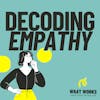EP 462: Decoding the Language of Empathy

Today, we peel back the layers of a term that's become ubiquitous in the business world and beyond: empathy.
In this episode, empathy's origin story. Er, stories. We'll explore its philosophical roots deep in the 19th century, through my personal trials and errors with empathy, to some of the challenges we face in empathizing with people we have less in common with. Ultimately, I want to explore the ways empathy invites curiosity, leverages imagination, and recognizes our differences.
This is the first in a 5-part series in which I'm decoding empathy. We'll talk brand strategy, non-violent communication, disability, and copywriting. And all throughout the series, we'll look for ways to recognize difference instead of assuming sameness.
Footnotes:
- Bewilderment by Richard Powers
- "Double empathy, explained" by Rachel Zamzow
- "On the Ontological Status of Autism: the 'double empathy' problem" by Damian Milton
- "Don't Mourn for Us" by Jim Sinclair
- Empathy: Philosophical and Psychological Perspectives by Amy Coplan and Peter Goldie
- Waiting for God by Simone Weil
Not Mentioned:
- Anderson, Ellie , and David Peña-Guzmán. 2020. “Episode 07: What’s the Deal with Empathy?” Overthink Podcast. December 1, 2020.
- Ganczarek, J., Hünefeldt, T., & Olivetti Belardinelli, M. (2018). From "Einfühlung" to empathy: exploring the relationship between aesthetic and interpersonal experience. Cognitive processing, 19(2), 141–145.
Every episode of What Works is also published in essay form at whatworks.fyi
If you love deep dives like this series, please consider becoming a premium subscriber. You get access to my premium columns, quarterly live workshops, and discussion thread. Visit: whatworks.fyi/subscribe
00:00 - The Language of Empathy
00:07 - Corporate Empathy
01:20 - Empathy's Origin Story
04:54 - My Empathy Engine
10:48 - Empathy in Richard Powers's Novel, Bewilderment
14:54 - The Double Empathy Problem
19:33 - No, Really: What Is Empathy?!
21:18 - 1. Empathy can be cognitive and/or affective.
22:19 - 2. Empathy is a product of imagination.
22:49 - 3. Empathy is situational.
23:44 - Recognizing Difference Is Part of Empathy
28:13 - Simone Weil's Attention
31:22 - Attention (and Empathy) Isn't Attached To Outcomes